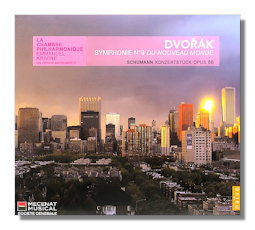
The Internet's Premier Classical Music Source
Related Links
-
Dvořák Reviews
Schumann Reviews - Latest Reviews
- More Reviews
-
By Composer
-
Collections
DVD & Blu-ray
Books
Concert Reviews
Articles/Interviews
Software
Audio
Search Amazon
Recommended Links
Site News
 CD Review
CD Review
Symphonie du nouveau Monde

On Period Instruments
- Antonín Dvořák: Symphony #9 "From the New World"
- Robert Schumann: Konzertstück for 4 Horns & Orchestra
David Guerrier, Antoine Dreyfuss, Emmanuel Padieu, Bernard Schirrer, horns
La Chambre Philharmonique/Emmanuel Krivine
Naïve V5132 DDD 60:47
It was only a matter of time before someone gave us Dvořák on period instruments. (The favor already has been done for Schumann!) It's a clever marketing idea, because collectors still are curious to hear familiar works done in an unfamiliar yet "authentic" way.
Krivine already has recorded Mendelssohn's "Italian" and "Reformation" symphonies with La Chambre Philharmonique, a French ensemble he created in 2004. Its members come from other European orchestras, and the ensemble is funded by the French Ministry of Culture. The booklet lists the provenance of all the ensemble's instruments, but it is not clear whether or not all of them are used in this particular recording. I suspect that they are. Eighteen violins are listed, seven violas, six cellos, and five double basses. Gut strings are used throughout. One of the violins dates from the late 1600s. Most of the instruments date from the 18th or 19th centuries, however, or are modern copies. In the Schumann, all four horns are from the mid to late 1800s. Schumann wrote the Konzertstück to exploit the chromatic valved horn, which was a relative newcomer to the instrumental world in 1849. Dvořák's "New World" comes from the very end of the same century, but the transition to what we think of as the "modern" symphony orchestra still was several decades away.
As expected, most of the particular interest associated with this recording is related to the sound of the instruments, not to the execution per se, which is on a high level but fairly standard. Krivine takes the exposition repeat in the first movement of the "New World," of which I approve. Overall, he is straightforward and favors brisk tempos, but only the Dvořák's Scherzo feel a little unimaginative. (On the other hand, the Largo has some rare gravitas to it.) With an orchestra approximately half the size of a modern orchestra, this "New World" still does not feel scrawny or underpowered (at least to me), and there is a nice transparency to the sound. With the strings, occasionally one misses the plushness of (say) the Berlin Philharmonic, but this CD occupies different territory. In the Schumann, the horns are uncommonly mellow, and indeed, there's a passage near the end (beginning at 1:05 in the last track) that sounds almost as if the four soloists stopped by the local café for a shot of Pernod before completing the sessions. Krivine's energetic conducting in the Schumann compensates for the smoothness of the horns' timbre.
This isn't the first version of the "New World" I would add to a beginner's collection, but it does a good job of satisfying one's curiosity about what "authentic" Dvořák would sound like. The bright engineering doesn't undo the clarity of the playing itself.
Copyright © 2009, Raymond Tuttle




















